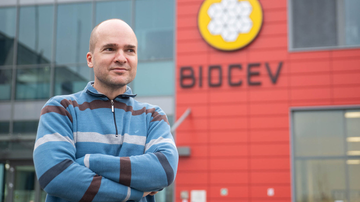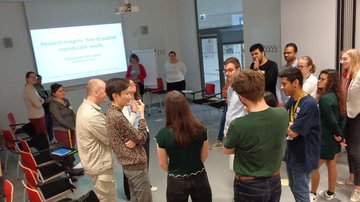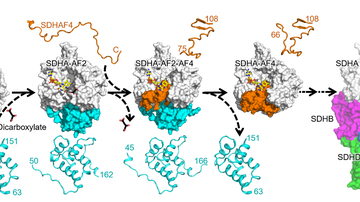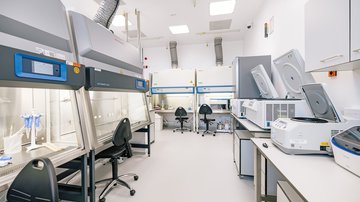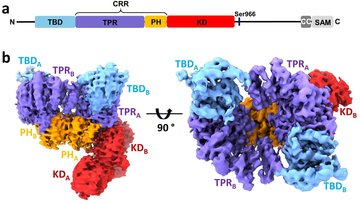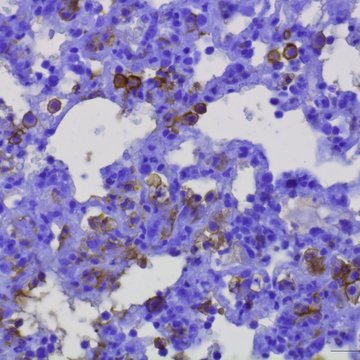
A newly developed antibody targets all major coronavirus mutations, Czech researchers have confirmed
An international team of scientists has developed a double antibody that is very effective in protecting against coronavirus SARS-CoV-2. Czech research laboratories from the Institute of Parasitology of the Biological Centre of the Czech Academy of Sciences (BC AS CR) and the Czech Centre for Phenogenomics (Institute of Molecular Genetics of the Czech Academy of Sciences) at BIOCEV have now confirmed in a preclinical study in mice that the newly developed antibody works on all three known dominant virus mutations – the British, South African and Brazilian. Another surprising finding of the study is the fact that the coronavirus can mutate very quickly: in the laboratory it became resistant to standard monoclonal antibodies in just two days, yet it could not mutate against the double antibody. The finding was presented by scientists from Switzerland, the USA, Italy, Sweden and the Czech Republic on Thursday, 25 March, in the prestigious scientific journal Nature.
The double, or bispecific, antibody was developed by Swiss researchers from a research institute in Bellinzona (The Institute for Research in Biomedicine). They used various antibodies collected from the blood of patients who had suffered from covid-19. These natural antibodies are commonly used in the treatment of patients, but their great weakness is that the virus can develop resistance to them, and the treatment no longer works. “In control mice, which we treated only with this monoclonal antibody, the virus mutated incredibly fast and became resistant in just two days. It had not been expected or observed by anybody before. It is a big exclamation point in terms of the use of antibodies against covid-19,” said Daniel Růžek from the Institute of Parasitology of BC AS CR and the Research Institute of Veterinary Medicine, who conducted a preclinical study. For this reason, it is necessary to use mixtures of different antibodies, which, however, are difficult and expensive to manufacture.
Therefore, Swiss scientists created a bispecific antibody in which they combined two natural antibodies into one molecule. This brings a number of indisputable advantages. First, this molecule replaces the need for an expensive mixture of natural antibodies at a fraction of the cost, making it an ideal candidate for treatment in poorer parts of the world. Secondly, the molecule targets two independent sites in the structure of the virus at the same time, preventing the virus from escaping the attack, and also from mutating. Thus, the bispecific antibody shows high potency. “We know that our antibody works on all three dominant mutations of the virus – the British, South African and Brazilian. Based on structural modelling, it can be assumed that it will be effective for other minor mutations as well,” said Daniel Růžek, explaining that it is unlikely that the virus will re-mutate at both sites where the bispecific antibody is heading, while retaining its ability to be fully virulent. In addition, tests have shown that a bispecific antibody can be used both to treat an infected patient and prophylactically, similar to a vaccination, with protection being immediate and lasting for weeks or months.
The success of preclinical testing was possible mainly thanks to a unique mouse model, which was developed especially for SARS-CoV-2 infection by scientists from the Czech Centre for Phenogenomics, the national research infrastructure at the BIOCEV centre. "Ordinary laboratory mice are not attacked by coronavirus, so they cannot be used for research. Since a suitable model for studying infection and therapy was not available, we developed a model based on a new principle, using an AAV-vector (similar to some vaccines), which introduces hACE – which is a gateway for allowing coronavirus into the cells – into experimental animals. “The mouse model developed by us is relatively unique and economical and closely represents severe cases of the disease that we have observed in humans, such as inflammatory responses in the lungs and the like,” said Radislav Sedláček, head of the Czech Centre for Phenogenomics (The Institute of Molecular Genetics of the AS CR at the BIOCEV centre).
The high level of effectiveness and overall characteristics of the new bispecific antibody are a key argument for initiating a human clinical study. The research consortium is already negotiating with a potential pharmaceutical partner.
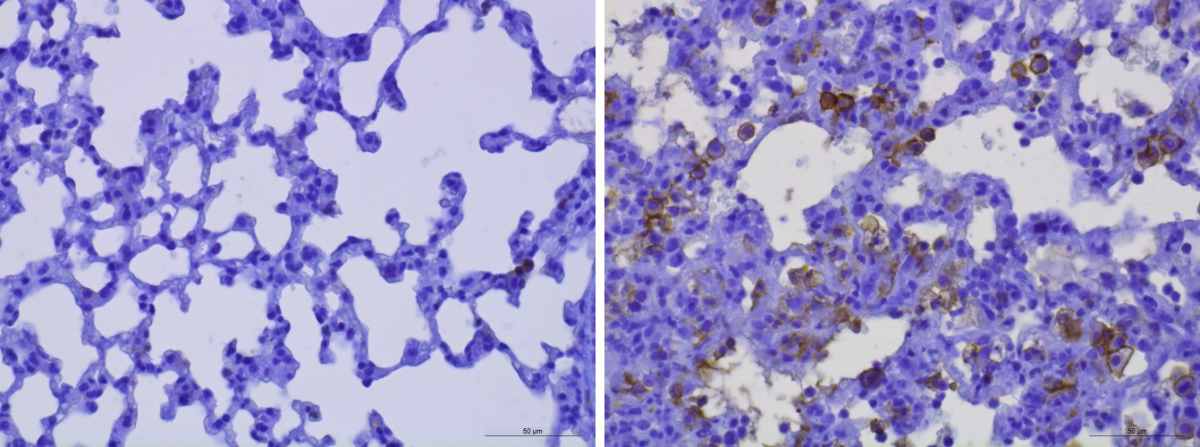
In addition to the above-mentioned Biological Centre of the ASCR in České Budějovice and the Czech Centre for Phenogenomics in Vestec near Prague, the Research Institute of Veterinary Medicine in Brno, the Institute of Organic Chemistry and Biochemistry in Prague and the Military Medical Institute in Těchonín also participated in the preclinical study. The success of Czech scientists in the field of coronavirus research and their immediate effective involvement in the fight against the pandemic proves that Czech know-how is among the world's best. In the Czech Republic, however, virological research is fragmented into smaller laboratories in several institutions and there is still a lack of suitable infrastructure at the national level that can unify it and provide an adequate basis for further developing it. The necessary impetus could be provided by the intended Virological Centre, for which the Academy of Sciences of the Czech Republic is negotiating support at the government level.
The bispecific antibody was developed within the ATAC research consortium, funded by the European Commission in response to the COVID-19 pandemic. Other members include San Matteo Hospital in Pavia (Italy), the Karolinska Institute (Sweden), Braunschweig University (Germany), the Joint Research Centre of the European Commission, Rockefeller University (USA) and the California Institute of Technology (USA). On the Czech side, the research was supported by the Ministry of Education, Youth and Sports and by the Grant Agency of the Czech Republic.
Full article at https://www.nature.com/articles/s41586-021-03461-y
De Gasparo, R., Pedotti, M., Simonelli, L. et al. Bispecific IgG neutralizes SARS-CoV-2 variants and prevents escape in mice. Nature (2021). https://doi.org/10.1038/s41586-021-03461-y
Source: The Biology Centre of the Czech Academy of Sciences







